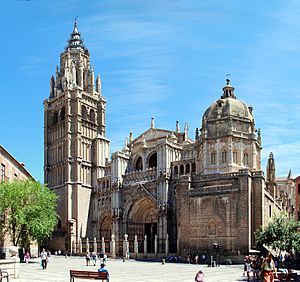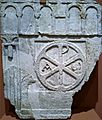Mozarabic Rite facts for kids
The Mozarabic Rite is a special way of worship used by the Roman Catholic Church in Spain. It's like a unique style of church service, with its own prayers, songs, and traditions. This ancient rite began a very long time ago, in the 1st century, making it one of the oldest forms of Christian worship still used today. It shows how Christianity developed in Spain over many centuries.
Contents
What is the Mozarabic Rite?
The Mozarabic Rite is a type of liturgy. A liturgy is the set of rules and practices for public worship in a church. Think of it as the script for a church service. Most Catholic churches around the world use the Roman Rite, which is the most common. However, the Mozarabic Rite is different. It has its own special prayers, hymns, and ways of celebrating Mass and other services.
Why is it called Mozarabic?
The name "Mozarabic" comes from the word "Mozarab". This was the name given to Christians who lived in Al-Andalus, which was the part of Spain ruled by Muslims from the 8th to the 15th centuries. Even though they lived under Muslim rule, these Christians kept their faith and their unique way of worship. The Mozarabic Rite is a living link to their history and traditions.
Where is it used today?
Today, the Mozarabic Rite is mainly used in Toledo, Spain, especially in the Toledo Cathedral. There's a special chapel there called the Corpus Christi Chapel where the Mozarabic Mass is celebrated daily. It's also used in a few other places in Spain, keeping this ancient tradition alive.
History of the Mozarabic Rite
The Mozarabic Rite developed in Spain during the time of the Visigothic Kingdom, before the Muslim conquest. It was the main way Christians worshipped across the Iberian Peninsula.
Early Christian traditions
In the early centuries of Christianity, different regions developed their own ways of worship. The Mozarabic Rite grew from the unique Christian traditions of Spain. It was influenced by early Christian practices and local customs.
Under Muslim rule
When Muslims conquered most of Spain in the 8th century, many Christians continued to live there. These "Mozarabs" were allowed to practice their religion, and they kept their special rite. This period helped preserve the rite, even as other parts of Europe adopted the Roman Rite.
Changes and preservation
Over time, the Roman Rite became more common in Spain. However, some people worked hard to preserve the Mozarabic Rite. One important person was Cardinal Francisco Jiménez de Cisneros in the 16th century. He helped to print books with the Mozarabic prayers and music, making sure the rite would not be forgotten.
Mozarabic Art and Music
The Mozarabic Rite is not just about prayers; it also has a rich history of art and music.
Unique manuscripts
Many beautiful old books, called manuscripts, were created for the Mozarabic Rite. These books contain special prayers, songs, and amazing illustrations. They are important historical treasures that show the unique style of Mozarabic art.
Ancient hymns and chants
The music of the Mozarabic Rite is very old and distinct. It includes special chants and hymns that are different from the Gregorian chants used in the Roman Rite. These ancient melodies add to the unique feel of the Mozarabic service.
Images for kids
-
Maiestas Domini and the symbols of the Four Evangelists from the León Bible of 960
-
The Second Coming of Christ (Facundus Beatus, AD 1047)
-
Monument to Archbishop Carrillo, Alcalá de Henares
-
Cardinal Francisco Jiménez de Cisneros by Matías Moreno (c. 1878)
-
The Mozarabic Chapel (Capilla Mozárabe) in the Cathedral of Toledo
-
The Talavera Chapel in the Old Cathedral of Salamanca
See also
 In Spanish: Liturgia hispánica para niños
In Spanish: Liturgia hispánica para niños















